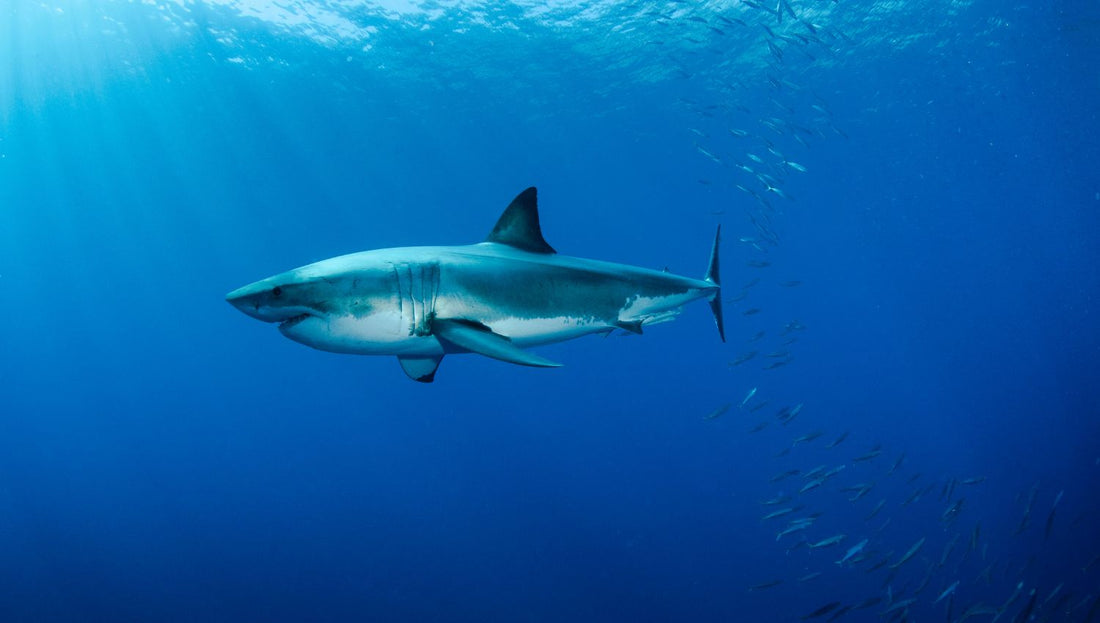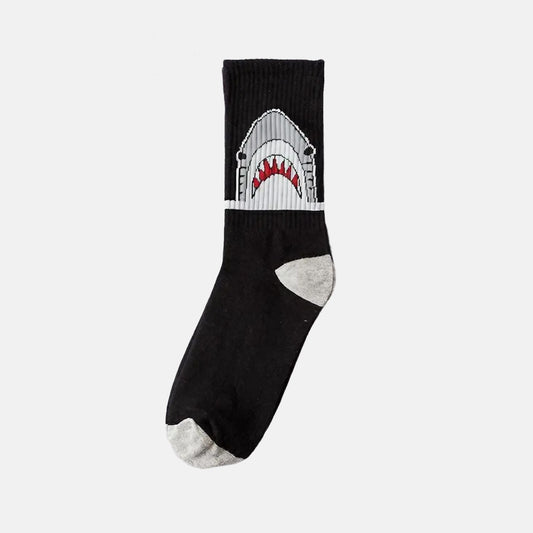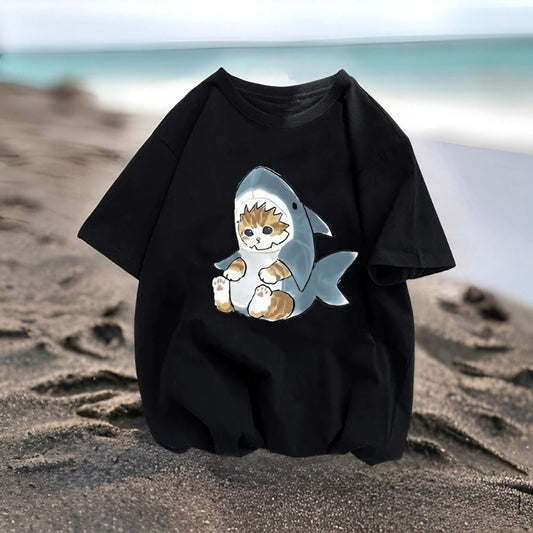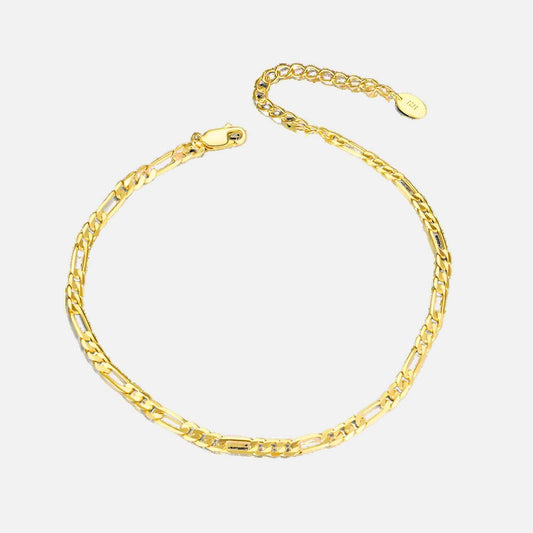
Marine predators
The oceans are full of mysteries and incredible biodiversity, with fascinating and sometimes frightening creatures . Among them, marine predators are the kings of the seas, playing a crucial role in the balance of ecosystems.
In this article, we will delve deep into the world of these majestic ocean hunters , exploring their world and answering the most frequently asked questions. Sail with us on this adventure and discover the wonders of the underwater world.
Marine predators, fascinating and formidable creatures
The great white shark, the most famous marine predator
The great white shark (Carcharodon carcharias) is undoubtedly the most famous and feared marine predator. This cartilaginous fish , present in temperate and subtropical oceans, can reach a size of 6 meters and weigh up to 2 tonnes.
The great white shark is a formidable hunter , capable of detecting blood and water vibrations from miles away. It feeds mainly on fish, marine mammals and carcasses of dead animals.
The orca, the sea wolf
The orca (Orcinus orca) is a marine mammal that belongs to the dolphin family. These majestic animals, also called killer whales, are the largest members of the dolphin family and can grow up to 30 feet long.
The orca is a fearsome predator, hunting in groups and using elaborate hunting strategies to capture their prey, such as seals , sea lions , and sometimes even whales .
The barracuda, the missile of coral reefs
The barracuda (Sphyraena barracuda) is a fast and agile predatory fish that mainly inhabits coral reefs and rocky areas. It has an elongated body, powerful jaws and long, sharp teeth. The barracuda hunts from ambush, propelling itself at high speed to catch prey, such as fish and cephalopods.
The manta ray, the soaring giant of the oceans
The manta ray (Mobula birostris) is one of the largest rays in the world, with a wingspan of up to 7 meters. Despite its imposing size, the manta ray is a rather peaceful predator that feeds mainly on plankton . It uses its large wing-like fins to move through the water and filter plankton through its gills.
Lionfish, the venomous invader
The lionfish (Pterois volitans) is a marine predator native to the Indo-Pacific Ocean that has spread to the Atlantic Ocean , where it has become an invasive species.
Equipped with radiating and venomous fins, the lionfish feeds on small fish and invertebrates. Its ability to reproduce rapidly and its absence of natural predators outside its native range make it a threat to marine ecosystems .
| Marine predator | Scientific name | Where to find the species |
|---|---|---|
| Great White shark | Carcharodon carcharias | Temperate and subtropical oceans |
| Orca | Orcinus orca | Oceans around the world |
| Tiger shark | Galeocerdo cuvier | Tropical and temperate oceans |
| Hammerhead shark | Sphyrna spp. | Tropical and temperate oceans |
| Barracuda | Sphyraena spp. | Tropical and subtropical regions |
| Grouper | Epinephelus spp. | Tropical and subtropical coral reefs |
| Lionfish | Pterois spp. | Indian Ocean, Pacific, tropical Atlantic |
| Scorpionfish | Scorpaenidae spp. | Pacific, Atlantic, Indian Ocean |
| Dolphin | Delphinidae spp. | Oceans around the world |
| Sperm whale | Physeter macrocephalus | Deep oceans around the world |
The essential roles of marine predators in the balance of ecosystems
Regulation of prey populations
Marine predators play a crucial role in regulating the populations of their prey . By controlling the number of prey, they help maintain a natural balance between different species and prevent overpopulation , which could lead to habitat degradation and a decrease in food resources.
Preserving biodiversity
Marine predators also contribute to the preservation of biodiversity. By hunting the weakest or sick individuals, they promote natural selection and the survival of the most robust species adapted to their environment. This dynamic helps maintain healthy populations and preserve the richness of marine ecosystems.
Threats to marine predators and their ecosystems
Overfishing and diminishing food resources
Overfishing is one of the main threats to marine predators. By taking large quantities of fish and other marine species , fishing activities reduce the availability of food resources for these animals. The reduction in prey can lead to a decline in the population of marine predators and a disruption of the balance of ecosystems.
Ocean pollution and habitat degradation
Ocean pollution , whether from plastic waste, chemicals or global warming, has a huge impact on marine life. The degradation of habitats and the modification of living conditions make the survival of marine predators and their prey increasingly difficult.
Changes in the distribution and abundance of species can lead to disruption of food chains and threaten the balance of ecosystems.
Conservation and protection measures for marine predators
The creation of marine protected areas
Marine protected areas (MPAs) are areas dedicated to the conservation of marine biodiversity and the protection of ecosystems. By limiting or prohibiting certain human activities, such as fishing or resource exploitation, MPAs allow populations of marine predators to recover and reproduce in a preserved environment.
Regulation of fishing and the fight against overfishing
The establishment of fishing quotas and strict regulations makes it possible to limit the pressure exerted on fish populations and other marine species. By combating overfishing, these measures contribute to the preservation of food resources for marine predators and to maintaining the balance of ecosystems.
Frequently asked questions about marine predators
Are marine predators dangerous to humans?
While certain marine predators, such as the great white shark, are often perceived as dangerous, attacks on humans are actually very rare. Most incidents are the result of confusion between humans and habitual prey of these animals. It is important to remember that marine predators are not monsters, but wild animals that play an essential role in the balance of the oceans.
How can we contribute to the protection of marine predators?
Everyone can act to protect marine predators by adopting responsible actions on a daily basis. For example, reducing your consumption of fishing products, choosing products labeled from sustainable fishing, or participating in awareness-raising and beach cleaning activities contributes to the preservation of marine ecosystems.
Conclusion on marine predators
In conclusion, marine predators are both fascinating and fearsome creatures, which play an essential role in the balance and preservation of ocean biodiversity. They are witnesses to the beauty and complexity of the underwater world, and their study allows us to better understand and protect marine ecosystems. However, these majestic ocean hunters face many threats, such as overfishing, pollution and habitat degradation. It is our responsibility to take action to ensure their conservation and contribute to a more sustainable future for our oceans.
Exploring more of the marine world, another interesting topic to discuss would be bioluminescent marine animals. These amazing creatures, which produce their own light through chemical reactions, provide a breathtaking spectacle and help us understand the mechanisms of survival and communication in the depths of the oceans. Dive into this mysterious universe and discover the hidden wonders of the abyss.






























